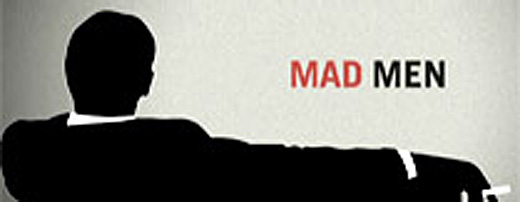Mad Men Note: Rehearsal

The shift continues: Don Draper, formerly an an anxious outsider, desperate to conceal the secrets of his past, has become the true insider, the one man who really knows how the world works. We already know from scattershots of Don’s pre-Don past that he’s a basically a decent sort of guy. Now, having acquired an exceptional authority at Sterling Cooper, Don is turning into a kind of Wotan, a flawed keeper of contracts who wields respect for What’s Right both as a weapon of justice and as a plinth.
His care for of Sal Romano is the touchstone. In the first episode, Don espied some dishy blackmail evidence about Sal, but, so far from using it to hurt the art director, he has made a point of treating Sal as a comrade. In “The Arragngements,” he responds to the news that the Patio spot’s director has dropped out with the suggestion that Sal direct the ad. After all, Don observes, Sal designed the storyboards, and the clients want a copy of Ann-Margaret in Bye-Bye Birdie. Sal is thrilled by the assignment — so thrilled that, in one of the most amazing scenes to issue from Mad Men, he reveals the problem of his sexuality to his wife, all unknowing, when he rehearses the spot for her, and you can see that she finally understands that he identifies his excitable self with a woman. (It’s a terrifying, heartbreaking scene: you don’t know whether to feel sorrier for Kit, whose eyes are opened, or for Sal, who still doesn’t understand himself.) The spot is duly produced and, when it bombs, we’re interested to note that none of Sal’s colleagues — especially Harry Crane, the agency’s TV guy — understand what was wrong with it.
The feint is utterly characteristic of the show. While the spot runs onscreen, we can tell that it’s not a success, but of course we don’t know why. We’re tempted to think that it’s because a gay man, unaware of his sexuality, has transgressed the limits of acceptable seduction. And perhaps he has, for the clients — the marketers of what turned out in fact to be a short-lived brand name — are speechlessly repelled. But Sal’s colleagues at Sterling Cooper shake their heads in bewilderment. To them, Sal’s spot did exactly what the client wanted it to do. Peggy Olson’s smirk reminds of what she said when the assignment came in: sometimes clients are wrong. Roger Sterling puts it well when he says that the girl in the ad isn’t Ann-Margaret. (And she isn’t!) Sometimes, it’s that simple.
Toward the end of the episode, Sal knocks at and enters Don’s office, saying that he has decided on coming to the woodshed before being invited. Don not only declines to punish, but recommends thinking of the episode this way: at last, Sal is a film director. It’s almost anachronistically wise, but Don is simply telling a gay man to go with the flow. On top of this, Don adds, he’d hire Sal again, notwithstanding the flop of the maiden effort. There is a kindness in Don’s protectiveness that changes the reasons for our rooting for him.
One thing that struck me forcibly is how sure of himself Don is in stocking feet. When he walks into Bert Cooper’s office — Bert is a Nipponophile, but one suspects that his real reason for requiring visitors to remove their shoes is his desire to disconcert them — you stare at his feet, because he walks as though he were wearing shoes, even though he isn’t. What’s this about? Most men would rather be barefoot, but it’s a private thing, and removing shoes in the workplace is discombombulating. (After all, you’re not supposed to be comfortable at work!) I haven’t gone back to look, but I seem to recall a certain self-consciousness among Bert’s stocking-footed visitors. This evening, in contrast, I felt that Don Draper dresses for the shoe-removal every day, that his socks are the best on the market, and nothing to be ashamed of; that, really, Don would be disappointed if an entire day went by without a visit to Bert Cooper’s office.
Bottom line: when the aliens land and list their demands, Don Draper is the guy we want to negotiate on our behalf. He has developed a fine sense of the difference between the Significantly Weird and the Merely Stupid. We’ve never needed such an arbiter more urgently. Â
